年新版五年级英语下册知识点归纳
五年级下册英语知识点归纳整理总结
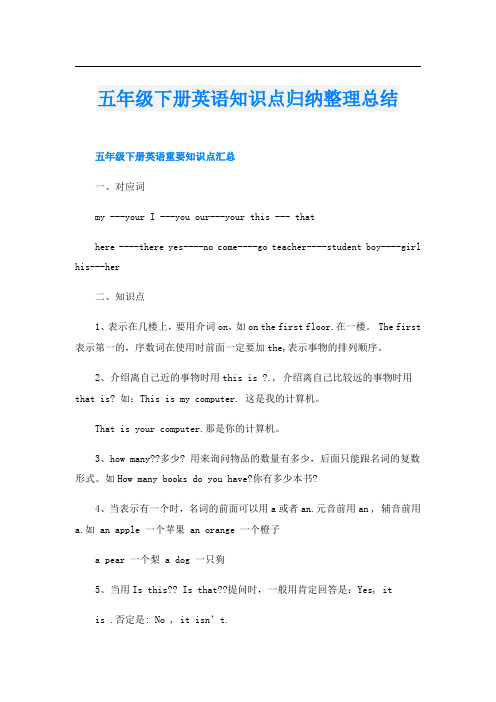
五年级下册英语知识点归纳整理总结五年级下册英语重要知识点汇总一、对应词my ---your I ---you our---your this --- thathere ----there yes----no come----go teacher----student boy----girl his---her二、知识点1、表示在几楼上,要用介词on,如on the first floor.在一楼。
The first 表示第一的,序数词在使用时前面一定要加the,表示事物的排列顺序。
2、介绍离自己近的事物时用this is ?., 介绍离自己比较远的事物时用that is? 如:This is my computer. 这是我的计算机。
That is your computer.那是你的计算机。
3、how many??多少? 用来询问物品的数量有多少,后面只能跟名词的复数形式。
如How many books do you have?你有多少本书?4、当表示有一个时,名词的前面可以用a或者an.元音前用an , 辅音前用a.如 an apple 一个苹果 an orange 一个橙子a pear 一个梨 a dog 一只狗5、当用Is this?? Is that??提问时,一般用肯定回答是:Yes, itis .否定是: No , it isn’t.三、句子:1、This is the teacher’s office.这是老师办公室。
2、That is my classroom.那是我的教室。
3、Go to the library. Read a story-book..去图书馆。
读故事书。
4、Is this the library? Yes, it is.这是图书馆吗?是的。
5Is that the art room? The art room is on the second floor.那是美术室吗?不是,美术室在二楼。
小学五年级英语下册知识点归纳总结

千里之行,始于足下。
小学五年级英语下册知识点归纳总结下面归纳了小学五年级英语下册的主要知识点:
1. 时态:学习了现在进行时、一般现在时和一般过去时的用法。
2. 句型:学习了不同句型的构成,例如陈述句、疑问句、否定句等。
3. 单词:词汇量增加,学习了更多的高频词汇,如动物名称、家庭成员、食物和运动等。
4. 语法:学习了基本的语法规则,如名词的单数和复数形式、形容词的比较级和最高级、副词的用法等。
5. 对话:学习了如何进行简单的对话,包括自我介绍、问候和交流等。
6. 阅读理解:学习了阅读并理解简单的文章和故事,并回答相关问题。
7. 写作:学习了如何写简单的句子和短文,以及如何描述人物和事件。
8. 听力:通过听力练习,培养对听力材料的理解和表达能力。
9. 课文:学习了课本中的相关课文内容,包括短文、对话和歌曲等。
这些都是小学五年级英语下册的主要知识点,学生需要通过课堂学习和课后复习来掌握和巩固这些知识。
第1页/共1页。
英语五年级下册知识点汇总
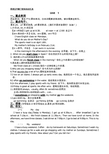
四会单词:课本P72黑体单词,白体词需要读准读熟,部分需要会默写。
二、重点句子:课本p4, p7要求背诵,p9要求熟读。
(请打开课本背诵吧!加油!)1.介词at, on, in的区别【at +时刻】I get up at 6:30. at noon = at 12:00 在正午【on+具体的一天】比如,on+星期,on+节日I have English class on Mondays.What do you do on Mother’s Day?The sports meet is on April 16th.My mother’s birthday is on February 21st.【in +季节,月份】I can swim in summer.in the morning/in the afternoon/in the evening 在早晨、在下午、在晚上2. When do you start class in Spain?你在西班牙什么时候开始上课?3. 询问某人什么时间做某事的句型When do you finish class in the morning?你们上午的课什么时候结束?4.表达某人某时间做某事的句型We finish class at 1 o’clock我们一点钟结束上午的课.5.Why are you shopping today? 你今天为什么购物?6.That sounds like a lot of fun.那听起来很有趣。
7.I live on an island. I always get up early every day. 我居住在一个岛上,我总是每天起很早。
8.I often go swimming in the water. 我经常在水里游泳。
9.In the afternoon, I play sports with my friend. 在下午,我和朋友进行体育运动。
(完整版)人教版五年级英语下册Unit1知识点汇总

Unit1 My day 知识整理△话题:谈论每天的活动及时间安排△词汇:do morning exercises(做早操)eat breakfast/lunch/dinner(吃早餐/午餐/晚餐)have...class(上…课),play sports(做运动)clean my room(打扫我的房间),go for a walk (散步) go shopping(购物),take a dancing class(上舞蹈课)△拓展词汇:get up(起床), go to bed(上床睡觉)wash my clothes(洗我的衣服), watch TV(看电视)do homework(做作业), play music(演奏音乐)cook dinner(煮晚餐), at home(在家)in the morning(在上午),in the afternoon(在下午)in the evening(在晚上),at night(在半夜)△句型:①询问做某事在几点When do you+动词原形(短语)+其他?—— At +时间—— I(+频度副词)+动词原形(短语)+at+时间。
例句:When do you get up in the morning?—— At 7:30.—— I often get up at 7:30.②询问周末的活动安排What do you often do on the weekend?I often (always/sometime/usually) +…(周末的活动)+with … (某人)+on the weekend (on Saturdays/on Sundays ).例句:What do you do on the weekend ?I often take a dancing class with my friend on Sundays. △知识点:1:注意介词的搭配at +具体时间(几点)/night/home at 9 o ’clock in +国家/季节 in Spainon +星期 on the weekend/on Sundays with +人 with my father/mother/friend 2:表示时间频率词的区别always 表示总是,一直;usually 表示经常,通常;often 表示经常,常常;sometimes 表示有时,间或。
五年级下册英语期末复习知识点

1一、词汇类1.季节词season (4个) spring 春天 summer 夏天 autumn 秋天 winter 冬天2.月份名称 (month 12个)March (Mar.)三月 April (Apr.)四月 May 五月June 六月 July 七月 August (Aug.)八月September(Sept.)九月 October(Oct.)十月 November (Nov.) 十一月December(Dec.)十二月 January(Jan.)一月 February(Feb.)二月3.序数词 (10个).first(1st) 第一(的) second (2nd)第二(的) third (3rd)第三(的)fourth (4th)第四(的) fifth(5th)第五(的) twelfth(12th)第十二(的)twentieth(20th)第二十(的) twentieth-first(21st)第二十一(的)twentieth-third(23rd)第二十三(的) thirtieth(30th)第三十(的)4.节日名称 ( 16个)New Year ’s Day 元旦() Women ’s day 妇女节()Tree-planting Day 植树节() April Fool ’s Day 愚人节()Easter 复活节 () May Day 劳动节()Dragon boat Festival 端午节(农历五月初五)Mother ’ s Day 母亲节(五月的第二个星期)Father ’ s Day 父亲节(六月的第三个星期天)Children ’s Day 儿童节() Army Day 建军节()Teachers ’ Day 教师节() Christmas 圣诞节()Mid-autumn Festival 中秋节(农历八月十五)China ’s National Day 国庆节()Thanksgiving Day 感恩节(11月第4个周四)形代(后面加名词) 名代(后面不加名词6.动词短语42个eat breakfast 吃早饭 wash my face 洗脸 read books 读书eat lunch 吃午饭 wash my clothes 洗我的衣服 drink water 喝水eat dinner 吃晚饭 watch TV 看视 listen to music 听音乐go to bed 上床睡觉 clean my room 打扫我的房间 eat ice cream 吃冰激go for a walk 散步 go on a picnic 去野餐 go to the beach 去沙滩play ping-pong 打乒乓球 play football 踢足球 play basketball 打篮球play sports 进行体育运动 play the pipa 弹琵琶 play with each other 一起玩耍go swimming 去游泳 go shopping 去购物 go hiking 去远足go skating 去滑冰 go running 去跑步 go boating 去划船go fishing 去钓鱼 pick apples 摘苹果 fly kites 放风筝do homework 做作业 do morning exercises 做早操 do kung fu 练武术have···class 上····课 take a dancing class 上舞蹈课pick apples 摘苹果 make a snowman 堆雪人 plant trees/flowersclimb trees 爬树 climb mountains 爬山 play in the snow 在雪里玩play with snow 玩雪7.活动名称 8个sports meet 运动会 Easter party 复活节聚会 school trip 学校旅行Chinese test 语文测试 singing contest 歌咏比赛 birthday party 生日聚会summer vacation 暑假 winter vacation 寒假8语音词汇 46个cl /kl/ clean打扫 clock钟表 class 班级 clever 聪明的pl /pl / plate 盘子 eggplant 茄子 please请 play 玩打br /br/ brown棕色的 ibrary 图书馆 brother 兄弟 umbrella 雨伞gr /gr/ green 绿色的 grapes葡萄 grandpa 爷爷 grow 生长ch/ ʧ/ China 中国 chicken 小鸡 lunch午餐 teacher 教师ch /k/ school 学校 Christmas 圣诞sh /ʃ/ sheep 绵羊 fish 鱼 shirt 衬衫 shorts 短裤th /θ / three 三 thin 瘦的 thirteen 十三 maths 数学th / ð/ this这个 that那个 mother 妈妈 brother 兄弟ng / ŋ/ long 长的 sing 唱 ring 铃响 young 年轻的nk / ŋk/ think想 ink墨水 trunk象鼻 pink粉色wh字母组合在o前发/h/ 其他的发/w/wh /w/ what什么 when 什么时候 where哪里 white 白的wh / h/ whose谁的 who 谁 whole完整的9. 频度副词always总是,(100%) usually通常(80%)often 经常(60%) sometimes有时(30%)10.天气的形容词:hot 炎热的 warm 暖和的 cool凉爽的 cold 寒冷的sunny晴朗的 cloudy 多云的 windy 多风的 rainy多雨的 snowy下雪的10.熟记标志语:Keep to the right 靠右 Keep your desk clean 保持桌子干净Talk quietly\ Quiet, please 请小点声Take turns 按顺序来Work quietly 安静学习 No eating 禁止吃东西二.语法知识点1.介词in . on. at的用法。
五年级下册英语知识点(打印版)

五年级下册英语知识点(打印版)语法知识点1. 一般现在时:这个时态用于描述惯性的动作或重复发生的情况。
例如:I eat breakfast every morning.(我每天早上吃早餐。
)2. 一般过去时:这个时态用于描述过去发生的事情。
例如:He watched a movie last night.(昨晚他看了一部电影。
)3. 将来时:这个时态用于描述将来要发生的事情。
例如:She will visit her grandparents next week.(下周她将去看望她的祖父母。
)4. 现在进行时:这个时态用于描述正在进行的动作。
例如:They are playing soccer in the park.(他们正在公园里踢足球。
)5. 情态动词:情态动词用来表示能力、建议、允许等情态。
例如:Can you swim?(你会游泳吗?)词汇知识点1. 动物:cat(猫)、dog(狗)、elephant(大象)、tiger(老虎)、lion(狮子)2. 食物:apple(苹果)、banana(香蕉)、orange(橙子)、watermelon(西瓜)、cake(蛋糕)3. 数字:one(一)、two(二)、three(三)、four(四)、five(五)4. 颜色:red(红色)、blue(蓝色)、yellow(黄色)、green (绿色)、purple(紫色)5. 学科:English(英语)、math(数学)、science(科学)、history(历史)、art(艺术)句型知识点1. How old are you?(你几岁了?)2. What's your favorite color?(你最喜欢的颜色是什么?)3. Can I have a piece of cake?(我可以吃一块蛋糕吗?)4. Where is the library?(图书馆在哪里?)5. What time is it?(现在几点了?)交际用语知识点1. Greetings(问候):Hello!(你好!)、Good morning!(早上好!)、How are you?(你好吗?)2. Introductions(介绍):My name is...(我的名字是...)、Nice to meet you!(很高兴认识你!)3. Requests(请求):Can I borrow your pencil?(我可以借用你的铅笔吗?)、Please help me.(请帮助我。
(完整版)小学五年级英语下册重点句型及短语汇总
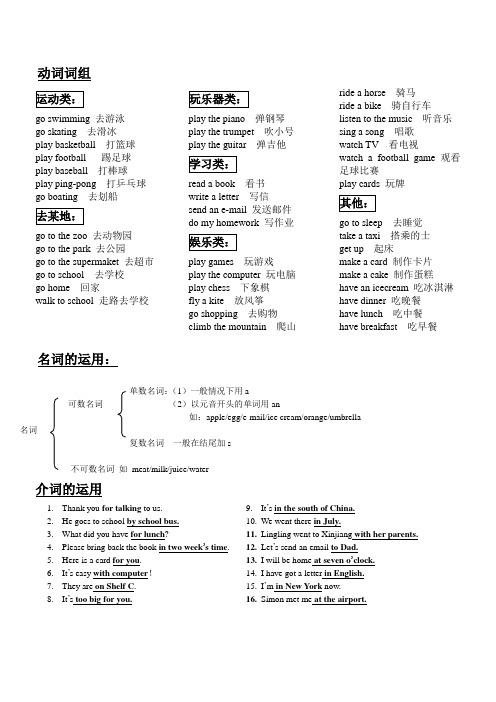
动词词组go swimming 去游泳go skating 去滑冰play basketball 打篮球play football 踢足球play baseball 打棒球play ping-pong 打乒乓球go boating 去划船go to the zoo 去动物园go to the park 去公园go to the supermaket 去超市go to school 去学校go home 回家walk to school 走路去学校play the piano 弹钢琴play the trumpet 吹小号play the guitar 弹吉他read a book 看书write a letter 写信send an e-mail 发送邮件do my homework 写作业play games 玩游戏play the computer 玩电脑play chess 下象棋fly a kite 放风筝go shopping 去购物climb the mountain 爬山ride a horse 骑马ride a bike 骑自行车listen to the music 听音乐sing a song 唱歌watch TV 看电视watch a football game 观看足球比赛play cards 玩牌go to sleep 去睡觉take a taxi 搭乘的士get up 起床make a card 制作卡片make a cake 制作蛋糕have an icecream 吃冰淇淋have dinner 吃晚餐have lunch 吃中餐have breakfast 吃早餐名词的运用:单数名词:(1)一般情况下用a可数名词(2)以元音开头的单词用an如:apple/egg/e-mail/ice cream/orange/umbrella 名词复数名词一般在结尾加s不可数名词如meat/milk/juice/water介词的运用1.Thank you for talking to us.2.He goes to school by school bus.3.What did you have for lunch?4.Please bring back the book in two week’s time.5.Here is a card for you.6.It’s easy with computer!7.They are on Shelf C.8.It’s too big for you.9.It’s in the south of China.10.We went there in July.11.Lingling went to Xinjiang with her parents.12.Let’s send an email to Dad.13.I will be home at seven o’clock.14.I have got a letter in English.15.I’m in New York now.16.Simon met me at the airport.一般过去时:表示过去某个时间里发生的动作或状态。
新精通版五年级下册小学英语全册单元知识点小结
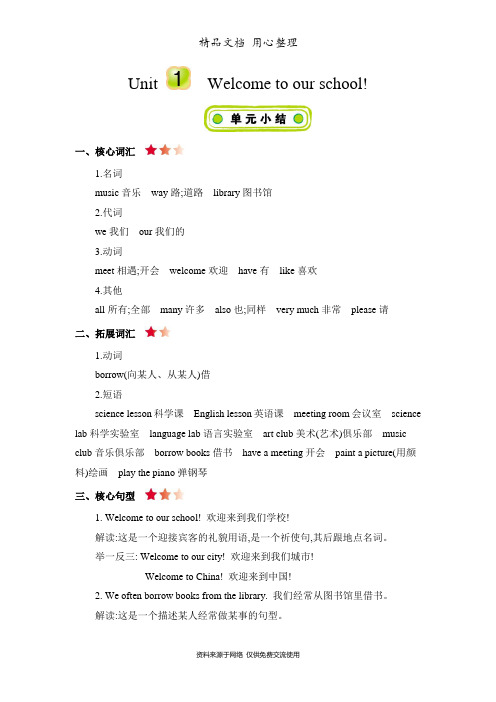
Unit Welcome to our school!一、核心词汇1.名词music音乐way路;道路library图书馆2.代词we我们our我们的3.动词meet相遇;开会welcome欢迎have有like喜欢4.其他all所有;全部many许多also也;同样very much非常please请二、拓展词汇1.动词borrow(向某人、从某人)借2.短语science lesson科学课English lesson英语课meeting room会议室science lab科学实验室language lab语言实验室art club美术(艺术)俱乐部music club音乐俱乐部borrow books借书have a meeting开会paint a picture(用颜料)绘画play the piano弹钢琴三、核心句型1. Welcome to our school! 欢迎来到我们学校!解读:这是一个迎接宾客的礼貌用语,是一个祈使句,其后跟地点名词。
举一反三: Welcome to our city! 欢迎来到我们城市!Welcome to China! 欢迎来到中国!2. We often borrow books from the library. 我们经常从图书馆里借书。
解读:这是一个描述某人经常做某事的句型。
举一反三: They often borrow some English books from Beijing Library. 他们经常从北京图书馆里借一些英语书。
3. —How many English lessons do you have in a week? 你们一周有多少节英语课?—We have three. 我们有三节。
解读:这是用来询问对方有多少节课的句型。
举一反三: —How many PE lessons do you have in a week? 你们一周有多少节体育课?—We have five. 我们有五节。
人教版PEP小学英语五年级下册知识点汇总(最新)
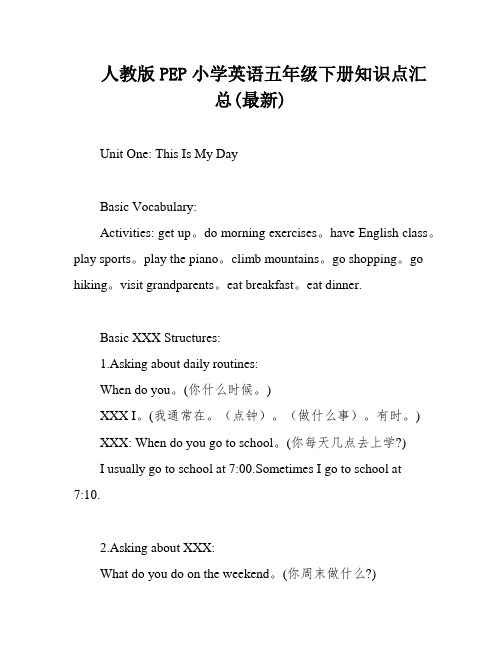
人教版PEP小学英语五年级下册知识点汇总(最新)Unit One: This Is My DayBasic Vocabulary:Activities: get up。
do morning exercises。
have English class。
play sports。
play the piano。
climb mountains。
go shopping。
go hiking。
visit grandparents。
eat breakfast。
eat dinner.Basic XXX Structures:1.Asking about daily routines:When do you。
(你什么时候。
)XXX I。
(我通常在。
(点钟)。
(做什么事)。
有时。
)XXX: When do you go to school。
(你每天几点去上学?)I usually go to school at 7:00.Sometimes I go to school at7:10.2.Asking about XXX:What do you do on the weekend。
(你周末做什么?)XXX I。
(我通常/经常。
有时。
)XXX: What do you do on the weekend?I often play XXX I go shopping with my mom.3.Introducing one's own habits:Every weekend。
I go hiking。
(我每个周末远足。
)Every day。
I do my homework at 8:00 in the evening。
(我每天晚上8点做作业。
)4.Asking XXX:What do you do。
(你是干什么的?)Time:morning。
afternoon。
evening。
noon。
at night。
6:00.on Sunday。
5年级下册英语的重点
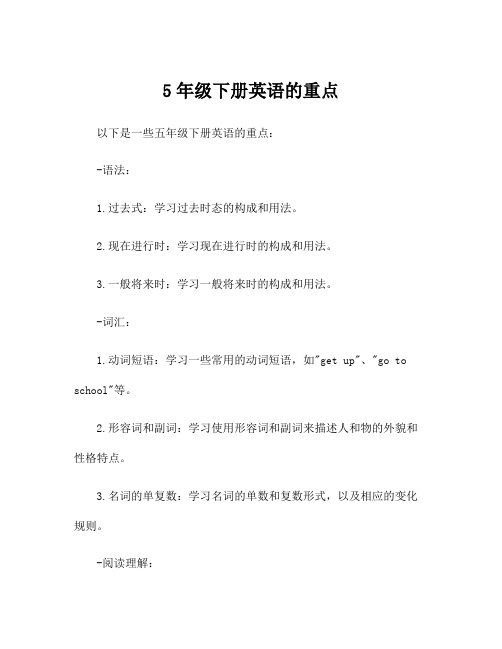
5年级下册英语的重点
以下是一些五年级下册英语的重点:
-语法:
1.过去式:学习过去时态的构成和用法。
2.现在进行时:学习现在进行时的构成和用法。
3.一般将来时:学习一般将来时的构成和用法。
-词汇:
1.动词短语:学习一些常用的动词短语,如"get up"、"go to school"等。
2.形容词和副词:学习使用形容词和副词来描述人和物的外貌和性格特点。
3.名词的单复数:学习名词的单数和复数形式,以及相应的变化规则。
-阅读理解:
1.短文理解:学习如何根据短文内容回答问题。
2.推理判断:学习通过对短文中信息的推理和判断,进行问题回答。
-口语表达:
1.日常交际用语:学习一些日常生活中常用的交际用语,如问候、请求、道谢等。
2.对话练习:通过对话练习,培养听说能力。
3.情景对话:学习在特定情境下进行对话交流。
-写作技巧:
1.句子结构:学习如何组织和连接句子,使文章流畅。
2.简单的写作练习:学习如何描述人、物、事件等,以及如何按
照时间顺序组织自己的写作。
这些只是五年级下册英语的一部分重点,具体的重点内容可能会
因不同教材和学校的教学要求而有所不同。
建议您根据教材和老师的
指导,仔细学习相关内容。
【思维导图】译林版(三起)五年级下册英语知识点整理
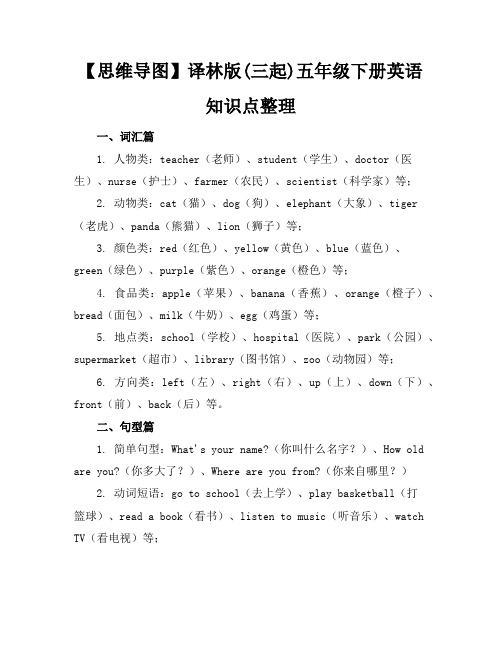
【思维导图】译林版(三起)五年级下册英语知识点整理一、词汇篇1. 人物类:teacher(老师)、student(学生)、doctor(医生)、nurse(护士)、farmer(农民)、scientist(科学家)等;2. 动物类:cat(猫)、dog(狗)、elephant(大象)、tiger (老虎)、panda(熊猫)、lion(狮子)等;3. 颜色类:red(红色)、yellow(黄色)、blue(蓝色)、green(绿色)、purple(紫色)、orange(橙色)等;4. 食品类:apple(苹果)、banana(香蕉)、orange(橙子)、bread(面包)、milk(牛奶)、egg(鸡蛋)等;5. 地点类:school(学校)、hospital(医院)、park(公园)、supermarket(超市)、library(图书馆)、zoo(动物园)等;6. 方向类:left(左)、right(右)、up(上)、down(下)、front(前)、back(后)等。
二、句型篇1. 简单句型:What's your name?(你叫什么名字?)、How old are you?(你多大了?)、Where are you from?(你来自哪里?)2. 动词短语:go to school(去上学)、play basketball(打篮球)、read a book(看书)、listen to music(听音乐)、watch TV(看电视)等;3. 形容词短语:very good(很好)、too hot(太热)、so big (这么大)、not tall(不高)等;4. 比较级:taller than(比……高)、shorter than(比……矮)、thicker than(比……厚)等;5. 时间状语从句:When it's sunny, I go to the park.(当天气晴朗时,我去公园。
外研版(三起)2022-2023五年级英语下册M1--M10知识点复习 - 下册
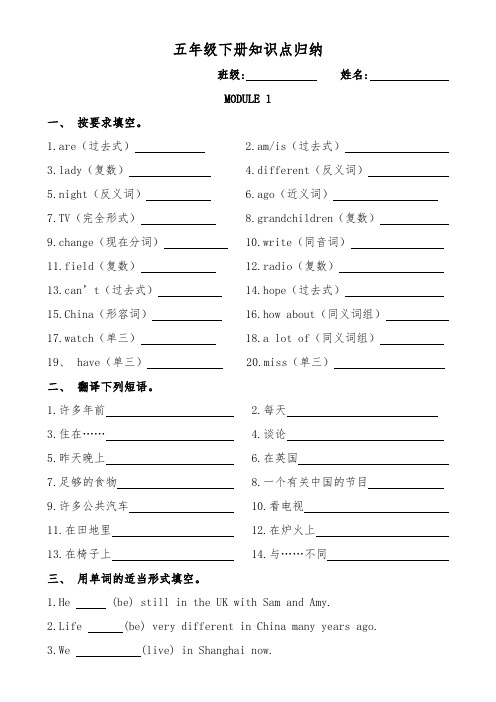
五年级下册知识点归纳班级: 姓名:MODULE 1一、按要求填空。
1.are(过去式)2.am/is(过去式)dy(复数)4.different(反义词)5.night(反义词)6.ago(近义词)(完全形式) 8.grandchildren(复数)9.change(现在分词) 10.write(同音词)11.field(复数) 12.radio(复数)13.can’t(过去式) 14.hope(过去式)15.China(形容词) 16.how about(同义词组)17.watch(单三) 18.a lot of(同义词组)19、have(单三) 20.miss(单三)二、翻译下列短语。
1.许多年前2.每天3.住在……4.谈论5.昨天晚上6.在英国7.足够的食物 8.一个有关中国的节目9.许多公共汽车 10.看电视11.在田地里 12.在炉火上13.在椅子上 14.与……不同三、用单词的适当形式填空。
1.He (be) still in the UK with Sam and Amy.2.Life (be) very different in China many years ago.3.We (live) in Shanghai now.4.Beijing is (change) .5.Thank you for (talk) to (we).6.She (watch) TV every day.7.What about (listen) to music.8.There weren’t (some) radios.9.She (can’t) read (and) write before.10.He (have got) four legs.11.I hope you are (good).12.She (live) in a big house now.四、句型转换。
1.We lived in a small house.(划线提问)2.She couldn’t read or write.(变肯定句)3.There was a cat on the chair before.(变复数句)4.He has got strong legs.(变一般疑问句,并作否定回答)5.There were some buses and cars.(变否定句)6.I was in the park three days ago.(划线提问)7.很多事情与过去不同.(汉译英)8.世界正在非常快速地变化着。
五年级英语下册重点知识归纳

五年级英语下册重点知识归纳重点知识归纳:五年级英语下册第一单元本单元的重点词汇包括:eat breakfast(吃早餐)、have class(上课)、play sports(进行体育运动)、exercise(活动、运动)、do morning exercises(早锻炼)、eat dinner(吃晚饭)、clean my room(打扫我的房间)、go for a walk(散步)、go shopping(去购物)、take(研究、上课)、dancing (舞蹈)、take a dancing class(上舞蹈课)、a.m.(上午)、p.m.(下午)和usually(通常地)。
除了以上词汇外,还有其他日常活动,如get up(起床)、eat lunch(吃午饭)、go to bed(上床睡觉)、wash my face(洗脸)、wash my clothes(洗我的衣服)、watch TV(看电视)、play ping-pong(打乒乓球)、play the pipa(弹琵琶)、go swimming(去游泳)、go running(去跑步)、do homework(做作业)和do kungfu(练武术)等。
在频度副词方面,有always(总是、一直,100%)、usually(通常,80%)、often(经常,60%)和sometimes(有时,30%)。
疑问词方面,重点是when(什么时候)和why(为什么)。
本单元的重点句型包括询问别人什么时候做某事的句型及回答和询问别人周末做什么的句型及回答。
对于第一种句型,问句结构为:When do you+动词短语原形+其他?回答结构为:I/we(+频度副词)+动词短语原形+at+具体时间。
需要注意的是,当主语是第三人称单数时,助动词do要变成does。
对于第二种句型,问句结构为:What do you do on the weekend?回答结构为:I(+频度副词)+动词(短语)+其他。
人教版小学英语五年级下册各单元知识点

人教版小学英语五年级下册各单元知识点Unit 1: My dayIn this unit, students learn to talk about their daily routines and the time in English. They also learn to express their likes and dislikes about different activities.Some of the key vocabulary words and phrases include:- Get up- Have breakfast- Go to school- Have lunch- Have dinner- Watch TV- Play games- Read books- Do homework- Brush teeth- Go to bedStudents are introduced to the verb "to be" and learn how to make simple sentences with it, such as "I am happy" or "He is tired". They also practice asking and answering questions using "what", "when", and "where".Unit 2: Colors and clothesIn this unit, students learn to identify and name colors, clothing items, and accessories in English. They also learn to describe their own clothing and what they are wearing.Some of the key vocabulary words and phrases include:- Red- Blue- Green- Yellow- Orange- Purple- Pink- White- Black- T-shirt- Dress- Pants- Skirt- Shoes- Socks- Hat- Bag- SunglassesStudents learn about the use of prepositions such as "on", "in", and "under" to describe clothing and daily routines. They also practice using adjectives to describe colors and clothing, and learn to ask and answer questions such as "What color is your shirt?" and "What are you wearing today?"Unit 3: Food and drinksIn this unit, students learn to talk about different types of food and drinks in English. They also learn about healthy eating habits and meal times.Some of the key vocabulary words and phrases include:- Pizza- Sandwich- Rice- Noodles- Salad- Fruit- Vegetables- Juice- Milk- Water- Breakfast- Lunch- Dinner- SnackStudents learn about the use of countable and uncountable nouns when talking about food and drinks. They also practice using the articles "a", "an", and "the" correctly. They learn to express likes and dislikes about different foods and drinks using the verb "to like" and "to dislike".Unit 4: Holidays and festivalsIn this unit, students learn about different holidays and festivals celebrated around the world. They learn to talk about the traditions, customs, and symbols associated with these celebrations.Some of the key vocabulary words and phrases include:- Christmas- Easter- Halloween- New Year- Valentine's Day- Thanksgiving- Dragon Boat Festival- Mid-Autumn Festival- Lantern Festival- Traditions- Customs- Symbols- FireworksStudents learn to ask and answer questions about holidays and festivals. They learn to use vocabulary related to greetings, gifts, and decorations. They also practice using the verb "to celebrate" to talk about different celebrations.Unit 5: Animals and petsIn this unit, students learn about different types of animals and pets. They learn to describe their appearance, behavior, and habitat. Some of the key vocabulary words and phrases include:- Dog- Cat- Fish- Bird- Rabbit- Hamster- Snake- Monkey- Elephant- Tiger- Giraffe- Zoo- Forest- Sea- SkyStudents learn to use adjectives to describe animals, such as "cute", "fierce", or "big". They practice asking and answering questions about pets and their owners, and learn about basic pet care and responsibilities.Unit 6: Weather and seasonsIn this unit, students learn to talk about different types of weather and the four seasons. They learn to express their preferences and activities associated with each season.Some of the key vocabulary words and phrases include:- Sunny- Cloudy- Rainy- Snowy- Windy- Spring- Summer- Fall/Autumn- Winter- Sun- Rain- Snow- Leaves- FlowersStudents learn to use verbs to describe weather and activities, such as "to swim" or "to play snowballs". They also practice using simple present tense to make statements and ask questions. They learn to use adjectives to describe weather, such as "beautiful", "hot", or "cold".Unit 1: My dayIn this unit, students will be introduced to the basic vocabulary and phrases related to their daily routines and the time.The teacher can start by asking students when they usually wake up, and elicit the verb "to get up". Then, the class can work on making sentences like "I get up at 7 o'clock in the morning" or "He gets up early". The teacher can also introduce basic adverbs of frequency, such as "always", "usually", "sometimes", and "never".The class can then move on to discussing meals, such as breakfast, lunch, and dinner. Students can practice using the verb "to have" to describe what they eat and drink, such as "I have cereal and milk for breakfast" or "She has a sandwich for lunch". They can also learn to talk about their favorite foods and drinks, and use expressions like "I like" or "I don't like".The teacher can also introduce basic verbs related to daily activities, such as "to go", "to come", "to watch", "to play", "to read", and "to do". Students can learn to make sentences like "I go to school by bus" or "He plays games after school". The teacher can also teach prepositions of place, such as "at", "in", and "on", todescribe daily routines in more detail.Finally, the class can practice telling time in English, using both the 12-hour and 24-hour clock formats. Students can work on making sentences such as "It's 7 o'clock" or "It's half past nine". Unit 2: Colors and clothesIn this unit, students will learn to identify and name different colors, clothing items, and accessories.The teacher can start by introducing basic colors, such as red, blue, green, yellow, and so on. Students can practice using colors to describe different objects, such as "a red car" or "a blue shirt". The class can also work on making sentences like "I like wearing green clothes" or "She has a pink bag".Next, the teacher can introduce different types of clothing, such as T-shirts, dresses, pants, skirts, shoes, socks, hats, and bags. The class can learn to use prepositions of place to describe clothing, such as "on", "in", or "under". For example, "I wear my T-shirt under my jacket" or "She puts her shoes in the closet".The class can also learn about different accessories, such as sunglasses, watches, and jewelry. Students can practice using vocabulary to describe accessories, and make sentences like "He wears a watch on his wrist" or "She likes wearing earrings". Finally, the teacher can introduce the concept of describing what someone is wearing. The class can practice using adjectives to describe clothing, such as "casual", "formal", or "fancy". They canalso practice asking and answering questions about each other's outfits, such as "What are you wearing today?" or "Do you like my shirt?"Unit 3: Food and drinksIn this unit, students will learn about different types of food and drinks, and healthy eating habits.The teacher can start by introducing basic food vocabulary, such as pizza, sandwich, noodles, salad, fruit, and vegetables. Students can practice using the verb "to have" to describe what they eat and drink, and learn to make sentences like "I have a banana for breakfast" or "She has a salad for lunch".The class can also learn about different types of drinks, such as juice, milk, and water. They can practice using vocabulary to describe drinks and make sentences like "He drinks orange juice in the morning" or "She likes drinking milk before bed".Next, the teacher can introduce vocabulary related to meal times, such as breakfast, lunch, dinner, and snack. The class can learn to use the correct articles "a", "an", and "the" when talking about food and drink, and practice making sentences like "I have an apple for a snack" or "We eat dinner at 6 o'clock".Finally, the class can learn about healthy eating habits, such as eating fruits and vegetables, and drinking enough water. They can practice expressing likes and dislikes about different foods and drinks using the verbs "to like" and "to dislike", and learn to make sentences like "I like apples but I dislike broccoli".Unit 4: Holidays and festivalsIn this unit, students will learn about different holidays and festivals celebrated around the world.The teacher can start by asking students if they celebrate any special holidays or festivals, and elicit different types of celebrations. Then, the class can learn about some of the most common holidays and festivals, such as Christmas, Easter, and Halloween, and discuss their traditions and customs.Next, the class can learn about different traditions and symbols associated with holidays and festivals from different cultures. For example, they can learn about the dragon boat festival in China, the mid-autumn festival in Vietnam, and the lantern festival in Japan.The teacher can also introduce vocabulary related to greetings, gifts, and decorations. Students can practice making sentences like "I gave my mom a card for Mother's Day" or "We decorate the Christmas tree with ornaments". The class can also practice using the verb "to celebrate" to talk about different celebrations.Finally, the class can learn about how holidays and festivals are celebrated in different countries and cultures. They can learn about different foods, costumes, and activities associated with each celebration.Unit 5: Animals and petsIn this unit, students will learn about different types of animals andpets.The teacher can start by asking students what animals they like or dislike, and elicit different types of animals. Then, the class can learn to identify and name different animals, such as dogs, cats, fish, birds, and so on.Next, the class can learn about different types of pets, such as dogs, cats, hamsters, and rabbits. They can practice using vocabulary to describe pets and make sentences like "I have a dog named Max" or "She likes to play with her cat".The teacher can also introduce vocabulary related to animal behavior, such as "cute", "fierce", or "friendly". The class can learn to use adjectives to describe animals, and practice making sentences like "The tiger is fierce but the bunny is cute".Finally, the class can learn about basic pet care and responsibilities. They can learn about feeding, grooming, and playing with pets, and practice making sentences like "I walk my dog every evening" or "She cleans her fish tank every week".Unit 6: Weather and seasonsIn this unit, students will learn to talk about different types of weather and the four seasons.The teacher can start by asking students what their favorite season is, and elicit different types of seasons. Then, the class can learn to identify and name different types of weather, such as sunny, cloudy, rainy, and snowy.Next, the class can learn about the different activities and events associated with each season. For example, they can learn about swimming and camping in the summer, apple picking and Halloween in the fall, skiing and ice skating in the winter, and gardening and Easter in the spring.The teacher can also introduce basic verbs related to weather and activities, such as "to swim", "to play", or "to ski". Students can practice making sentences like "I swim in the lake on hot days" or "She skis with her family in the winter".Finally, the class can learn to express their preferences and dislikes about each season, using expressions like "I love spring because of the flowers" or "I don't like winter because it's too cold". They can learn to use adjectives to describe weather, such as "beautiful", "hot", or "cold", and practice asking and answering questions using simple present tense.。
英语五年级下册知识点整理

译林新版小学五年级下册知识点整理Unit 1知识点一、单词:because 因为 fairy 仙女 fit 合适,合身have to 不得不,必须 leave…behind 留下,丢下mushroom 蘑菇 prince 王子 understand 明白,理解pick 摘,拾 take off 脱下 be bad for有害的clothes 衣服 let 让 put on 穿上 before 在…以前try on 试穿 late 迟的 pick 摘二、词组:at the prince’s house 在王子的房子 be sad 伤心go to the party 去聚会 don’t have any nice clothes or shoes没有漂亮的衣服或鞋子come back 回来 have a good time 过得愉快at the party 在聚会 take off 脱下 try on 试穿 have to go必须走leave…behind 留下,丢下 in the forest 在深林里under a tree在一棵树下 pick a big red mushroom摘一个大红色的蘑菇look so nice 看起来很漂亮 are bad for us 对我们有害的三、句型:Why are you so sad 你为什么这么伤心Because I can’t go to the party. 因为我不能去参加聚会;Why 为什么Because I don’t have any nice clothes and shoes.因为我没有漂亮的衣服或鞋子;四、语法:c an’t = can not don’t =do notUnit 2知识点一、单词:far from 离……远 near 在……附近 by …乘……bus 公共汽车 ,大巴士 on foot 步行 metro 地铁taxi 出租车,的士 bike自行车 plane 飞机 ship轮船train 火车 ride 骑车 show 给……看 basket 篮子city城市二、词组:your new home 你的新家 very big 很大 far from school 离学校远live on Moon Street 住在月亮街上near City Library在城市图书馆附近 come to school 来学校by bus 乘公共汽车 on foot 步行by metro 乘地铁by taxi 乘出租车 a taxi driver 一位出租车司机in the park 在公园里 can fly 会飞 show his bike to sam 展示他的自行车给山姆看too young 太小年龄 sit in the basket 坐在篮子里三、句型:Where do you live 你住在哪里I live…我住在…… I live near/ far from…我住在附近/离远How do you come to school 你怎样来学校的I come to school…我来学校……Unit 3知识点一、单词:along 沿着,顺着 ask the way 问路ask…for help 向……求助full 满的,饱的 get to 到达 next to 在……旁边on your right 在你的右侧; See you later. 一会儿见; traffic light交通灯 turn left向左转 turn right 向右转bookshop 书店 get off 下车 get on 上车take 搭乘 walk 走;步行 street 街道 excuse me劳驾;对不起cinema 电影院 hospital医院 shop商店 zoo动物园supermarket超市 stop车站 over结束二、词组:want to visit 想要参观 get to 到达 get on上车 get off 下车at Park Station在公园站 walk to 走到 next to 在……旁边on the street 在街上 come out from从……出来ask a policeman for help 向一位警察求助 go along this street 沿着这条街走 on your right 在你的右侧 see a new film 看一部新电影wait for the bus 等公交车 take the metro 乘地铁 be over 结束at the traffic lights 在交通灯 turn left向左转 turn right 向右转三、句型:How do I get to …我怎样到达……Go along this street.沿着这条街走;Turn left /right at the traffic lights. 在交通灯向左/右转;Get on/ off …at …在……上/下车;You can see the bookshop on your right.你可以看见书店在你的右手侧;Unit 4知识点一、单词:see the doctor 看医生 feel 感觉 toothache 牙疼 anything 任何东西bedtime 就寝时间 check 检查 dentist 牙医 giraffe 长颈鹿have a rest 休息 point at 指着,指向 should 应该brush one's teeth 刷牙 drink water 喝水take medicine 吃药neck 脖子二、词组:see the doctor 看医生 have a headache 头痛 feel cold 感觉冷let me check 让我检查 have a fever 发烧 have a rest 休息at home 在家 take some medicine 吃些药drink some warm water 喝些温水 eat a lot of sweets 吃许多糖see the dentist 看牙医 too many sweets 太多糖before bedtime 在就寝时间以前 brush your teeth 刷牙三、句型:What’s wrong with ………怎么了I /They have a fever/headache…我/他们发烧/头痛……He / She has a cold/ toothache…他/她感冒/牙痛……What should … do……应该怎么做… should have a rest. …应该休息;四、语法:have → has 三单 shouldn’t = should not tooth → teethUnit 5知识点一、单词:parent 父或母 clean 擦,洗 cook 烧,煮 busy 忙的go away 走了,离开 ladybird 瓢虫 make the bed 整理床铺pest 害虫 sweep the floor 扫地 wash the dishes 洗碗grow 种植 garden 花园 sweet 甜的二、词组:Saturday morning 周六早上 clean the car 擦车 help him 帮他cook breakfast 做早饭 in the kitchen 在厨房 sweep the floor 扫地make the bed 整理床铺cook dinner 做晚饭wash the dishes 洗碗clean the table 擦桌子 eat fruit 吃水果 watch TV 看电视wash clothes 洗衣服 grow grapes 种葡萄 big and sweet 又大又甜go away 走了,离开 so sweet 真甜 in the garden 在花园里三、句型:What are you/they doing 你/他们在做什么I am/They are watching TV. 我/他们在看电视;What is he /she doing 他/她在做什么He/She is sleeping. 他/她在睡觉;四、语法:现在进行时结构:Be + 动词的ing形式;do →doing三种情况:1.直接加-ing 2.双写末尾字母加ing 3.去e加ingUnit 6知识点一、单词:game 游戏,比赛 angry 生气的,愤怒的 drive... away 赶走I can't wait 我等不及了 meat猪、牛、羊等的肉potato马铃薯,土豆 spot 斑,点 tomato 西红柿vegetable蔬菜 win 获胜,赢 yummy 好吃的,美味的smell 有……气味,闻起来 look for 寻找 ready 准备好love 喜爱,喜欢 bread 面包 catch 抓,抓走二、词组:in the evening 在晚上 come home 回家 a football game 一场足球赛his parents 他的父母 smell nice 闻起来香wash some vegetables 洗些蔬菜 some tomato soup 一些西红柿汤cook meat with potatoes 肉煮土豆 I can't wait我等不及了look for 寻找 some juice 一些果汁 apple juice 苹果汁orange juice 橘子汁 a great cook 出色的厨师a lot of pests许多的害虫 come to help 来帮助 drive... away 赶走how many spots 多少个点三、句型:Are you cooking meat 你在煮肉吗No,I’m not. 不,我不是;Is he looking for some juice 他在找果汁吗No, he isn’t . 不,他不是;There is some meat/bread/juice/milk in the fridge.有些肉/面包/果汁/牛奶在冰箱里;There are some potatoes in the fridge. 在冰箱里有些土豆;四、语法:there be 句型中, be动词的形式要看他后面所跟的名词;若是名词单数/不可数名词,则用is;可数名词复数,则用are;tomato -→tomatoes potato -→ potatoesUnit 7知识点一、单词:Chinese New Year 中国农历新年 Double Ninth Festival 重阳节dragon boat race 赛龙舟 Father's Day 父亲节get together 团聚 Mother's Day 母亲节 rice cake 重阳糕rice dumpling 粽子 Dragon Boat Festival 端午节dumpling 饺子 February 二月 festival 节日January 一月 June 六月 May 五月Mid-Autumn Festival 中秋节 moon cake 月饼 mountain山,山脉November 十一月 October 十月 place 地方,地点September 九月 Spring Festival 春节 call 叫作,称作place 地点 old 老的二、词组:Chinese festivals 中国的传统节日 Spring Festival 春节in January or February 在一月或二月Chinese New Year 中国农历新年 get together 团聚eat dumpling 吃饺子 Dragon Boat Festival 端午节in May or June 在五月或六月 dragon boat race 赛龙舟eat rice dumpling 吃粽子 Mid-Autumn Festival 中秋节look at the moon 赏月 at night 在夜里 eat moon cake 吃月饼Double Ninth Festival 重阳节 old people 老人climb mountains 登山 eat rice cake 吃重阳糕Mother's Day 母亲节Father's Day 父亲节 at this festival 在这个节日on the second Sunday of May 在五月的第二个星期天 talk about 谈论a good idea 好主意三、句型:The Spring Festival is in January or February.春节在一月或二月;The Dragon Boat Festival is in May or June. 端午节在五月或六月;What do people du on Mother’s Day 人们在母亲节做什么四、语法:节日、月份这类专有名词单词的第一个字母都要大写:Spring Festival January;月份的英语书写可以缩写到单词的前三个字母:January→Jan.February→Feb. 特殊的September→Sept.Unit 8知识点一、单词:eighth 第八 eleventh 第十一 fight 打仗;打架fourth 第四 hero 英雄 password 密码April 四月 August 八月 birthday 生日December 十二月 July 七月 March 三月together 一起 go shopping 去购物 play 戏剧number 数字 answer 答案 start 开始二、词组:on the eleventh of May 在5月11日 on the eighth of April 在4月8日have a big dinner 吃一顿丰盛的晚餐 with our parents 和我们的父母eat some noodles 吃些面条 play with 和……玩have a great time 玩得很开心 a birthday cake 一个生日蛋糕have a party 举行聚会 at home 在家 play some games 玩些游戏have a lot of fun 玩得很开心 go shopping 去购物open the door 开门 be easy for me 对我来说很容易be good at Math 擅长数学 the first number 第一个数字start fight 开始打仗 run away 逃跑三、句型:When’s your birthday 你的生日在什么时候It’s on the the eleventh of May.在5月11日;四、语法:日期的表达方法:the 日序数词of 月如: the eleventh of May基变序,有规律;词尾加上th ; 一二三,特殊记;词尾字母tdd ,八减t ,九减e ;F要把ve替 ,Ty把 y 变成i,记住th 前有个e;语法点归纳be动词:我用am, 你用are,is连接他,她,它;单数名词用is,复数名词全用are;变疑问,往前提,句末问号莫丢弃;变否定,更容易,be后not莫忘记;疑问否定任你变,句首大写莫迟疑;1.like + 动词ing,如:like swimming2.go + 动词ing,如:go climbing3.how many +可数名词,如: how many watches4.how much + 不可数名词,如: how much water5.序数词前一定加the ,如:the first day6.在几点用at, 如 at 7 o’clock ,在某一天或某一天的具体时间段用on ,如:on Sunday, on Sunday morning, 直接在早上、下午或晚上用in,如:in the morning7.动词后代词用宾格动宾如:join me8.介词后代词用宾格介宾如:with him ,to her9.want to do sth 动词加副词动副,如: dance beautifully 15.some 用于肯定句,any 用于否定句16.There be 在某地有某物强调位置采用就近原则,如:There is a teacher and some students in the classroom.17.不可数名词有:water coffee tea milk juice bread rice food fruit paper chocolate exercise fishpeople18.乐器前加the, 球类前不加the,如:play the piano, play football 19.who当作特殊的第三人称单数;20. 现在进行时结构:Be 动词+动词ing动词变化规则:1.直接加ing , 2.去e加ing , 3.双写末尾字母加ing句型转换否定变化be动词am、is、are+not、情态动词can+ not、助动词do、does + not如何将一个肯定句改为否定句:1、看句中有无be动词,如有,直接在be动词后+ not;2、看句中有无情态动词,如有,直接在情态动词后+ not;3、如都没有,就用助动词+ not;分四个步骤:1位置:肯定句中本来是没有助动词的,要加上去,位置在主语某人或某物后,动词前;2确定助动词用do、does,根据句中动词,动词是原形的助动词就用do,动词是第三人称单数的助动词就用does,3在助动词后加not;4原句中动词发生变化就要恢复成原形;强调一点,有some的要考虑是否要用any;人称代词疑问词。
五年级下册英语1到4单元知识点

五年级下册英语1到4单元知识点Unit 1: Holidays and festivals1. Vocabulary:- Holiday: A day when people do not go to work or school because of a special occasion.- Festival: A special time or event when people gather to celebrate something.- Celebrate: To do something special or enjoyable because of a special occasion.- Parade: A public celebration where people walk or drive along a route.- Costume: Special clothes that people wear for a party or festival.2. Grammar:- Present Simple Tense: Used to talk about habits, routines, facts, and general truths.- Adverbs of frequency: (Always, usually, often, sometimes, rarely, never) Used to show how often something happens.- Wh-questions: Questions that start with words like who, what, where, when, why, and how.3. Skills:- Reading: Understand different types of holidays and festivals around the world (e.g., Christmas, Thanksgiving, Chinese New Year).- Listening: Listen to conversations about holiday plans, traditions, and activities.- Speaking: Talk about favorite holidays and festivals and discuss how they are celebrated.- Writing: Write sentences and short paragraphs about holiday customs and traditions.Unit 2: Travelling1. Vocabulary:- Trip: A journey to a place and back again.- Journey: The act of traveling from one place to another.- Route: A way or course taken in getting from a starting point to a destination.- Vehicle: A machine that transports people or goods.- Sightseeing: To visit places of interest in a city or region.2. Grammar:- Present Continuous Tense: Used to talk about actions happening at the moment of speaking.- Imperatives: Commands or orders used to give instructions.- Prepositions of place: (In, on, at, by) Used to show the position or location of something.3. Skills:- Reading: Understand different types of transportation and travel destinations.- Listening: Listen to dialogues about booking tickets, planning trips, and giving directions.- Speaking: Describe travel experiences, ask for information, and give advice about traveling.- Writing: Write emails or postcards describing a recent trip, including details about accommodation, transportation, and sightseeing.Unit 3: Weather and seasons1. Vocabulary:- Weather: The condition of the atmosphere at a particular place and time.- Season: One of the four periods of the year (spring, summer, autumn, winter).- Temperature: How hot or cold the air is.- Forecast: A prediction of the weather in the future.- Sunny, cloudy, rainy, snowy: Different types of weather conditions.2. Grammar:- Present Continuous Tense: Used to talk about temporary actions happening now.- Comparative adjectives: (Bigger, smaller, hotter, colder) Used to compare two things.- Superlative adjectives: (The biggest, the smallest, the hottest, the coldest) Used to compare three or more things.3. Skills:- Reading: Understand the characteristics of each season and how they affect the weather.- Listening: Listen to weather forecasts, descriptions of seasons, and discussions about dressing for the weather.- Speaking: Talk about favorite seasons, describe typical weather in different seasons, and discuss clothing choices for different weather conditions.- Writing: Write short essays about favorite seasons, create weather forecasts, and describe seasonal activities and events.Unit 4: Animals and habitats1. Vocabulary:- Habitat: The natural home or environment of an animal, plant, or other organism.- Endangered: Threatened with extinction or destruction.- Species: A group of living organisms capable of interbreeding.- Predators: Animals that hunt and kill other animals for food.- Herbivores, carnivores, omnivores: Different types of animals based on their diet.2. Grammar:- Present Simple Tense: Used to talk about habits, routines, facts, and general truths.- Countable and uncountable nouns: Countable nouns can be counted (e.g., animals, trees), while uncountable nouns cannot be counted (e.g., water, air).- How much/many: Used to ask about the quantity of something (how much for uncountable nouns, how many for countable nouns).3. Skills:- Reading: Understand different types of animals and their habitats, including endangered species.- Listening: Listen to descriptions of animals, their behaviors, and their relationships with other animals.- Speaking: Talk about favorite animals, habitats, animal conservation, and animal-related activities.- Writing: Write reports about endangered animals, create posters about animal habitats, and describe animal behaviors and characteristics.。
新人教版小学英语五年级下册1-2单元知识点复习
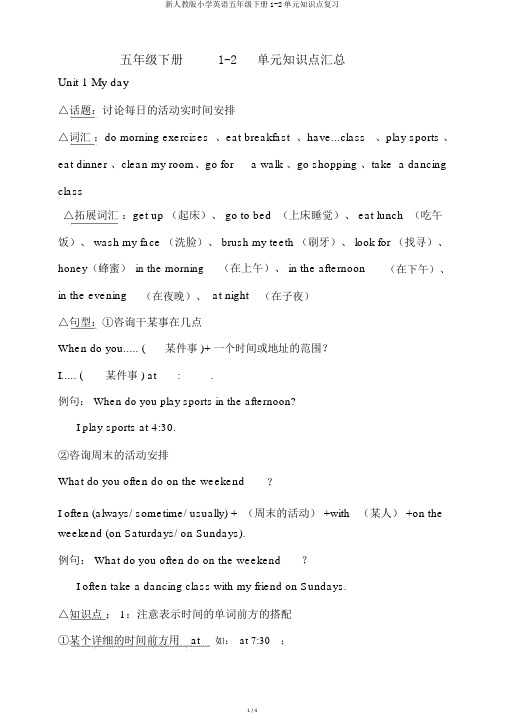
五年级下册1-2 单元知识点汇总Unit 1 My day△话题:讨论每日的活动实时间安排△词汇:do morning exercises 、eat breakfast 、have...class 、play sports 、eat dinner 、clean my room、go for a walk 、go shopping 、take a dancing class△拓展词汇:get up (起床)、 go to bed (上床睡觉)、 eat lunch (吃午饭)、 wash my face (洗脸)、 brush my teeth (刷牙)、 look for (找寻)、honey(蜂蜜)in the morning (在上午)、 in the afternoon (在下午)、in the evening (在夜晚)、at night (在子夜)△句型:①咨询干某事在几点When do you..... ( 某件事 )+ 一个时间或地址的范围?I..... ( 某件事 ) at ___:_____.例句: When do you play sports in the afternoon?I play sports at 4:30.②咨询周末的活动安排What do you often do on the weekendI often (always/ sometime/ usually) +(周末的活动) +with (某人) +on the weekend (on Saturdays/ on Sundays).例句: What do you often do on the weekend?I often take a dancing class with my friend on Sundays.△知识点: 1:注意表示时间的单词前方的搭配①某个详细的时间前方用at如:at 7:30;②在周末 weekend的前方则用 on 而且加 the 如: on the weekend ;但在礼拜几前方用on 而且不加 the 如: on Saturday ;③在 morning 、afternoon 、evening 前方用 in ,而且加 the 如:in the morning ;④在 night前方用at如:at night。
五年级英语下册【单词、短语、句型】期末重点知识归纳
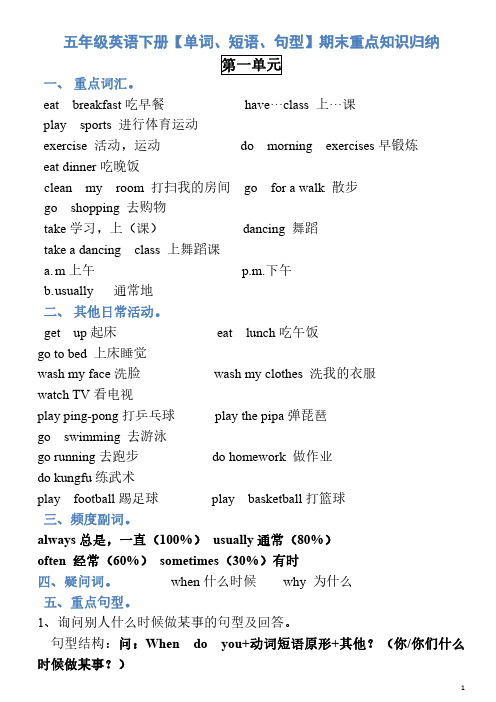
五年级英语下册【单词、短语、句型】期末重点知识归纳一、重点词汇。
eat breakfast吃早餐have···class上···课play sports进行体育运动exercise活动,运动do morning exercises早锻炼eat dinner吃晚饭clean my room打扫我的房间go for a walk散步go shopping去购物take学习,上(课)dancing舞蹈take a dancing class上舞蹈课a.m上午p.m.下午ually通常地二、其他日常活动。
get up起床eat lunch吃午饭go to bed上床睡觉wash my face洗脸wash my clothes洗我的衣服watch TV看电视play ping-pong打乒乓球play the pipa弹琵琶go swimming去游泳go running去跑步do homework做作业do kungfu练武术play football踢足球play basketball打篮球三、频度副词。
always总是,一直(100%)usually通常(80%)often经常(60%)sometimes(30%)有时四、疑问词。
when什么时候why为什么五、重点句型。
1、询问别人什么时候做某事的句型及回答。
句型结构:问:When do you+动词短语原形+其他?(你/你们什么时候做某事?)答:I/we(+频度副词)+动词短语原形+at+具体时间(我/我们通常在几点做某事。
)例:问:When do you go to bed?(你什么时候上床睡觉?)答:I go to bed at9:00p.m(我晚上9点上床睡觉。
)注意:当主语是第三人称单数(he,she,it,单个人名或单数名词)时,助动词do要变成does,句型结构是:when does+主语(第三人称单数)+动词短语原形+其他?2、询问别人周末做什么的句型及回答。
五年级下册英语第一单元整理归纳

精品文档五年级(下)Unit 11.单词:run 跑sorry 对不起,不好意思(道歉时用)jump 跳;跳跃sing 唱;演唱dance 跳舞sit 坐down 向下;朝下;沿着stand 站立;直立up 向上;在上面see 看见;明白;会见(过去式为saw)boy 男孩(复数boys)girl(复数girls) 女孩now 现在draw 画picture 图画;图片woman 女人(复数women) talk 交谈;讨论baby 婴儿(复数babies) cry 哭;哭泣;喊叫who 谁sleep 睡觉;入睡man 男人(复数men) hungry 饥饿的water 水tea茶(some tea 一些茶) candy 糖果(some candy一些糖果)train(火车)tree树(复数trees) window 窗户banana香蕉(复数bananas 一根香蕉a banana) dumpling饺子(通常使用的都是其复数形式dumplings)behind 在….之后tired 疲劳的,累的fruit水果(some fruit 一些水果) water 水(some water 一些水)swim游泳happy 高兴的sad 伤心的newspaper报纸paper纸card 卡片,纸牌(复数cards)find 发现,找到2.短语:go straight 直行turn left 左转turn right 右转ride a bike 骑自行车sit down坐下起立stand up站起来look at 看(某人或某物)look out of 从….向外看read the newspaper看报纸read a book /read books看书draw a picture /draw pictures 画画sing a song /sing songs 唱歌play football 踢足球play basketball 打篮球play ping-pong 打乒乓球play cards打扑克(with和…) watch TV看电视do my homework做作业have breakfast吃早餐have lunch吃午餐have dinner 吃晚餐take a picture / take pictures照相fly a kite / fly kites放风筝look out of the window 向窗户外面看wash my face 洗脸wash my hands 洗手make my bed 叠被子,整理床铺句子:3.祈使句:(祈使句是用来表达命令、请求、劝告、警告、禁止等的句子。
五年级英语下册必背知识点汇总

五年级英语下册必背知识点汇总Unit 1: My Friends- Vocabulary: Words related to family and friends, such as father, mother, sister, brother, friend, etc.- Grammar: Possessive pronouns (my, your, his, her, etc.)- Sentence patterns:- This is my friend.- Her name is Lucy.- His father is a doctor.- My sister likes to play soccer.- Dialogue: Conversations about introducing family and friends.Unit 2: My School- Vocabulary: Words related to school, such as classroom, blackboard, teacher, student, etc.- Grammar: Singular and plural nouns.- Sentence patterns:- I have a new pen.- There are many students in our school.- The blackboard is big.- Dialogue: Conversations about school life.Unit 3: My Daily Routine- Vocabulary: Words related to daily activities, such as wake up, brush teeth, eat breakfast, etc.- Grammar: Simple present tense.- Sentence patterns:- I wake up at 7 o'clock every morning.- She brushes her teeth before breakfast.- They eat lunch at 12 o'clock.- Dialogue: Conversations about daily routines.Unit 4: My Hobbies- Vocabulary: Words related to hobbies, such as swim, paint, read, etc.- Grammar: Present continuous tense.- Sentence patterns:- He is swimming in the pool.- She is painting a picture.- They are reading a book.- Dialogue: Conversations about hobbies and leisure activities.Unit 5: My Town- Vocabulary: Words related to buildings and places in a town, such as hospital, library, park, etc.- Grammar: Prepositions of place.- Sentence patterns:- The hospital is next to the school.- The library is in front of the park.- The post office is between the bank and the supermarket.- Dialogue: Conversations about different locations in a town.Unit 6: My Country- Vocabulary: Words related to countries and nationalities, such as China, Japan, American, etc.- Grammar: Be verb (am, is, are).- Sentence patterns:- I am Chinese.- He is Japanese.- They are American.- Dialogue: Conversations about different countries and nationalities.Unit 7: My Travel- Vocabulary: Words related to travel, such as plane, train, car, etc.- Grammar: Simple past tense.- Sentence patterns:- I went to Beijing last month.- She traveled to Shanghai by plane.- They visited the Great Wall.- Dialogue: Conversations about travel experiences.Unit 8: My Future- Vocabulary: Words related to future plans and aspirations, such as job, doctor, teacher, etc.- Grammar: Future tense.- Sentence patterns:- I will be a doctor in the future.- She wants to be a teacher.- They plan to travel around the world.- Dialogue: Conversations about future goals.以上是五年级英语下册的必背知识点汇总,包括词汇、语法、句型和对话等内容。
- 1、下载文档前请自行甄别文档内容的完整性,平台不提供额外的编辑、内容补充、找答案等附加服务。
- 2、"仅部分预览"的文档,不可在线预览部分如存在完整性等问题,可反馈申请退款(可完整预览的文档不适用该条件!)。
- 3、如文档侵犯您的权益,请联系客服反馈,我们会尽快为您处理(人工客服工作时间:9:00-18:30)。
2017新版PEP五年级下册知识点归纳Unit 1吃早饭eat breakfast 吃午饭eat lunch 吃晚饭eat dinner 看电视watch TV打乒乓球play ping-pong 进行体育运动play sports 做早操do morning exercises 做作业do homework 上…课have…class 打扫房间 clean my room 洗衣服wash my clothes 起床get up上床睡觉go to bed 散步go for a walk 返回学校go back to school 去买东西go shopping 去游泳go swimming 上舞蹈课 take a dancing class 在西班牙 in Spain 在家 at home在周末on the weekend 午饭后after lunch 早上in the morning 晚上 at night在3点 at 3 o’clock 昨晚last night 善于,擅长be good at 许多a lot of/ lots of1. –When do you finish class in the morning 你们上午的课到几点结束– We finish class at 1 o’clock. 我们一点钟结束。
2. – When do you usually eat dinner 在西班牙你们通常什么时候吃晚饭– 9:30 or 10 o’clock. 通常在九点三十或十点钟。
3. –Why are you shopping today 今天为什么是你购物–last night. ’m shopping today. 我妈妈昨晚上班了。
所以今天我购物。
4. –What do you do on the weekend你周末干什么– I often watch TV and play ping-pong with my father.我经常看电视,也常和我爸爸打乒乓球。
like a lot of fun. 那听起来好像很有趣。
6. But I also hard-working. I usually wash my clothes. Sometimes I cook dinner.但我也很勤劳的。
我洗衣服,有时我做晚饭。
这是一封来自他的信。
(倒装句)8. I live on island. 我住在一座岛上。
9. I always get up early every day. 我每天总是很早起床。
10. Friday is good at sports. 星期五擅长体育活动。
clock. 三点开始上课。
cl, pl的发音:/kl / / pl /1. 询问作息时间:–morning exercises/… –7 o’clock/….2. 询问周末活动:–What do you do on the weekend –I always/usually/often/sometimes(频率副词)…频率副词的用法:描写周末活动:My weekendsI am Lin Ping. I am very busy on the weekend. On Saturdays, I often take a dancing class in the morning. In the afternoon, I often do my homework and help my mother clean the house. On Sundays, I always play ping-pong with my father in the morning and go shopping in the afternoon.I am busy but happy on the weekends. How about yoursUnit 2在雪中玩 play in the snow种花 plant flowers去野餐go on a picnic摘苹果 pick apples吃雪糕 eat ice cream 暑假summer vacation 堆雪人 make a snowman 看…… look at 去游泳 go swimming 寒假 winter vacation 做得好 good job 孩子们(复数)children 孩子们,你们喜欢这首音乐吗你最喜欢那个季节 – I like spring best. There are beautiful flowers everywhere. 我最喜欢春天。
(因为)到处都有美丽的花。
3. Spring is green with flowers and songs. Summer is hot and the days are long. Autumn is golden and farmers are busy. Winter is white and the year is gone. 春天火红柳绿歌声扬。
夏天炎热白昼长。
秋天金色农民忙。
冬天白色年已终。
(歌谣句子可选用于写作)4. The weather is good and the colours are beautiful! 天气很好,色彩很美丽!’t swim. 我喜欢夏天,但是我不会游泳。
6. What lovely colours ! 多美丽的颜色啊!(感叹句)7. I want to paint a picture, too! 我想画画!8. There is lots of snow . It is white everywhere. 有许多雪。
到处都是白的。
9. I like winter because I can play in the snow. 我喜欢冬天因为我可以在雪中玩。
10. I like summer best because of Children ’s Day. 我最喜欢夏天因为(有)儿童节。
我经常和家人去野餐。
[ br ], [ gr ]1. 询问喜欢那个季节的问与答:– Which season do you like best – ( I like ) spring best.2. 询问喜欢某个季节的原因的问与答:– Why (do you like summer/…) – Because I like summer vacation.3. because 和because of 的区别:because+从句, because of+名词(词组)/V-ing4. w, w 真神奇,问出许多大问题。
what, what, 问“什么”,when, when, 问“时间”,where, where, 问“哪里”,which, which ,“哪一个”,why, why, “为什么”。
Why do you like spring best 你为什么最喜欢春天Because the weather is nice.Which season do you like best 你最喜欢哪个季节 I like spring best.When do you go to school 你什么时候去学校 I go to school at 8 o ’clock.What do you often do on the weekend 在周末你经常做什么 I often go shopping.Where is your photo 你的照片在哪里 It ’s on the wall.描写自己最喜欢的季节:My favourite seasonThere are four seasons in a year. But I like spring best. Because it ’s warm and windy. The trees turn green and the flowers are beautiful. I can fly kites when it ’s windy. And I can go out for a picnic with my friends when it ’s sunny. In spring, I can plant trees, too.I love spring. Do you like itUnit 31. 元旦 New Year’s Day2. 寒假 winter vacation/ holiday3. 植树节Tree Planting Day4. 复活节派对 an Easter party5. 劳动节 May Day6. 母亲节 Mother’s Day7. 父亲节 Father’s Day8. 儿童节Children’s Day9.教师节 Teachers’ Day10. 中秋节 Mid-Autumn Day11. 中国国节庆China’s National Day12. 美国感恩节American Thanksgiving Day13. 圣诞节 Christmas 14. 学校郊游school trip 15. 运动会 sports meet 16. 歌唱比赛singing contest 17. 长城 the Great Wall 18. 今年 this year 19. 最喜欢的季节 favourite season 20. 一些 a few 21. 寻找 look for 22. 制作卡片 make a card 23. 给她唱歌 sing to her 24. 说“谢谢” say “Thankyou” 25. 给她写信 write her a letter 26. 给她讲故事 tell her a story 27. 为她弹琵琶play the pipa for her 28. 复活节兔子Easter Bunny 29. 滚复活节蛋 roll Easter eggs 30. 玩游戏 play games 31. 许愿 make a wish 32. 唱生日歌sing the birthday song 33. 吃面条 eat noodles 34. 吃生日蛋糕 eat a birthday cake 35. 吃月饼 eat mooncakes 36. 在聚会上at the party1. We have a few fun things in spring. After the sports meet, we have 在春天我们有一些趣事。
2. –派对在什么时候 – It ’在四月份。
